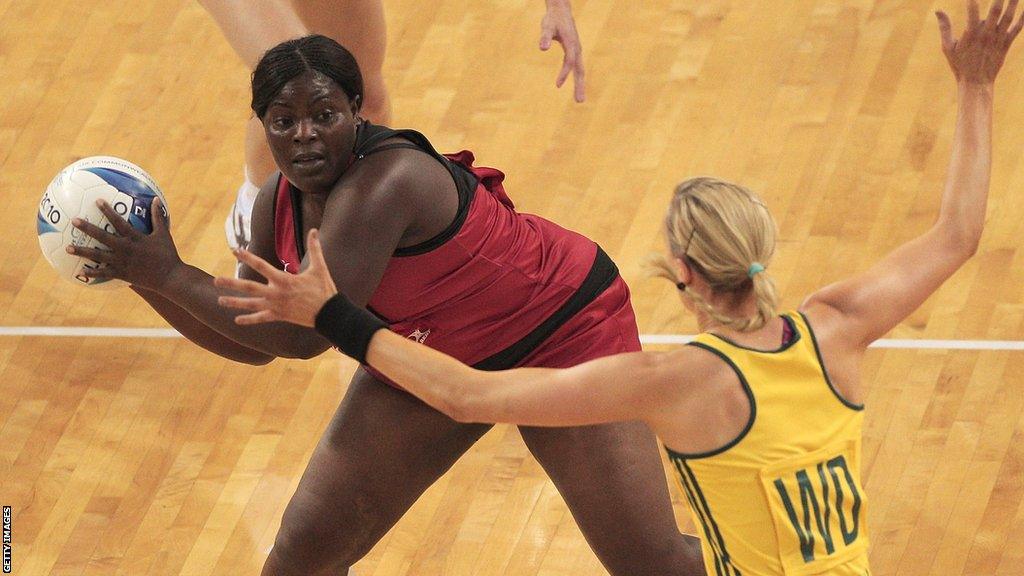Netball World Cup 2023: Male coaches 'biggest challenge' to African netballers - Malawi's Waya
- Published

Mary Waya made more than 200 appearances for Malawi, playing in multiple editions of the World Netball Championships, Commonwealth Games and World Netball Series
Malawi legend Mary Waya believes the behaviour of some male coaches in African netball remains the "biggest challenge" for female players.
Former World Cup star Waya said women are pressured into relationships in the hope of securing selection.
The 55-year-old claimed female players are made to feel "insecure" by coaches.
"Most African teams have male coaches, so that's the biggest challenge," Waya told the Africa Daily podcast, saying the issue has endured since she was a teenage player.
"You will find that when you go to the competition, to the changing rooms, you feel insecure because of these male coaches."
The Queens achieved their best ever finish at the World Cup, finishing fifth in New Zealand in 2007.
But Waya believes different gender dynamics between male and female coaches and players can cause problems.
"If they are female coaches, you feel safe because you have got a 'mother' near you," she added. "You know 'I'm protected'.
"With male coaches, we always look at them as our 'fathers' and then they easily tell us, 'I'm not your father - if you want to go to the national team, you have to be my [girlfriend], so that you can be at the top of the team'."
Waya, who has been part of the sport for 25 years and acted as a commentator at the 2023 World Cup in South Africa, watched Malawi impress at the tournament as the sixth-best team in the world secured wins over Scotland, Barbados, Fiji and Tonga during the preliminary stages.
Despite her concerns around male coaches, the flag bearer for her country at the 2010 Commonwealth Games in Delhi said netball remains hugely beneficial to players.
"It gives us mental and physical health," she said. "It shows us that we can be empowered and do things with our own mind and strength."
World Cup a 'catalyst' for equality
Nocawe Mafu, South Africa's deputy minister of sports, arts and culture, said leaders had been "over the moon" at hosting the World Cup, but called for greater equality.
"The main target was about motivating young women, girls and children, and making sure that it actually helps to promote women's sport in the country and Africa in general," she said of the tournament.
"Women in sport, in general, are doing well but they are not recognised at the same level as men. In most cases, they are doing much better than men because they have to prove themselves to the world.
"It's not supposed to be like that, but that's the way it is. And therefore governments and federations cannot be faulted much in terms of concentrating on men who are not putting their best foot forward, compared to women. The world is still patriarchal in nature."
More than 112,000 tickets were sold for the 2019 finals in England, with the number of people attending matches and watching or following the tournament surpassing six million, according to an impact evaluation carried out by UK Sport and Sheffield Hallam University.
Mafu said netball is played by 90% of women and young girls in South Africa and hopes the Cape Town edition will also prove inspiring.
"It becomes important that events you are hosting, like the World Cup, become a catalyst for making sure that the world recognises women are actually equal to men," she said.

The twisted mind of Michael Sams: Will Stephanie Slater's kidnapper be given parole?
A new drug, a new story, a new era: LA's streets are about to get more dangerous...
